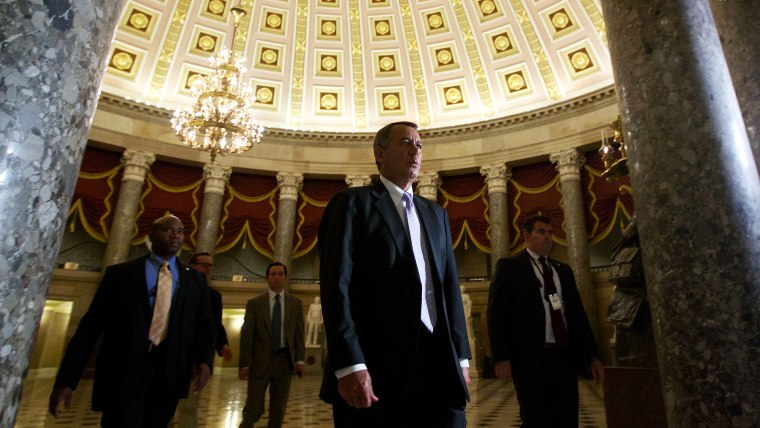Before 2011, Congress tended to transition from one legislative priority to the next. Some bills would pass, some would fail. Some would get a president's signature, some would be vetoed. Gridlock would occasionally muck things up, but there was a general sense that Capitol Hill was at least trying to address national challenges.
We've since entered a different phase of political history. Under the status quo, Congress doesn't transition from one priority to the next; it transitions from one self-imposed crisis to the next.
This week, for example, lawmakers narrowly averted a government shutdown, while at the same time, setting the stage for another shutdown fight in December. In between, it turns out, members will have to pass a debt-ceiling increase. Roll Call reported late yesterday:
The Treasury Department said Thursday it would reach the debt limit a bit earlier than was expected by many on Capitol Hill. Treasury Secretary Jacob J. Lew told Congress in a new letter that thanks in part to lower-than-expected quarterly tax receipts, the extraordinary measures to forestall breaching the debt limit, combined with the new revenues, will run their course just a week after the resignation of Speaker John A. Boehner, R-Ohio, takes effect. That makes it all the more likely the debt limit will need to be addressed before his departure.
Boehner's last day is reportedly set for Oct. 30.
Almost immediately, House Minority Leader Nancy Pelosi (D-Calif.) issued a press statement, calling on lawmakers to be responsible. “Failure to protect the full faith and credit of the United States would have a devastating impact on hard-working families across the country -- including tumbling retirement savings and rising interest rates for student loans, mortgages, credit cards and car payments.
"The Republican Congress must take the prospect of a catastrophic default off of the table. The credit rating of the United States is not a hostage to serve Republicans’ toxic special interest ideology. Yet time and again, the crisis-addicted Republican majority has threatened to shatter the foundation of our economy to advance their destructive partisan agenda.”
Well sure, when you put it that way, it sounds bad.
For what it's worth, there's no doubt that Boehner knows that debt-ceiling increases are mandatory. It's extremely unlikely that he'd want his last act as Speaker of the House to be a national default and deliberate economic catastrophe.
With this in mind, I'm reasonably optimistic that this next crisis will be averted. But if the next House Republican leadership team is even more right-wing -- and even more eager for reckless confrontations with the White House -- the threat to the U.S. economy will linger indefinitely.
The solution, should Boehner choose to consider it, would be to scrap the debt-ceiling law once and for all, eliminating the threat forever. If the Speaker considers such a move before his retirement, it may prove to be the single most beneficial thing accomplished for Americans during his entire tenure.
